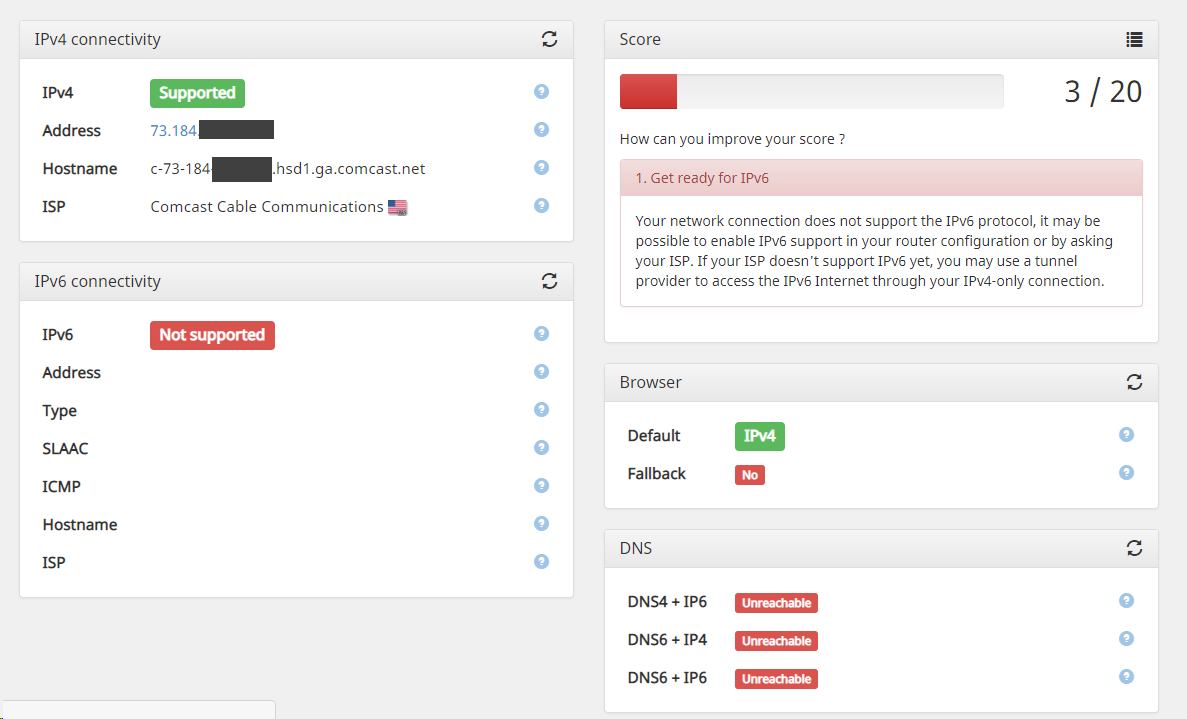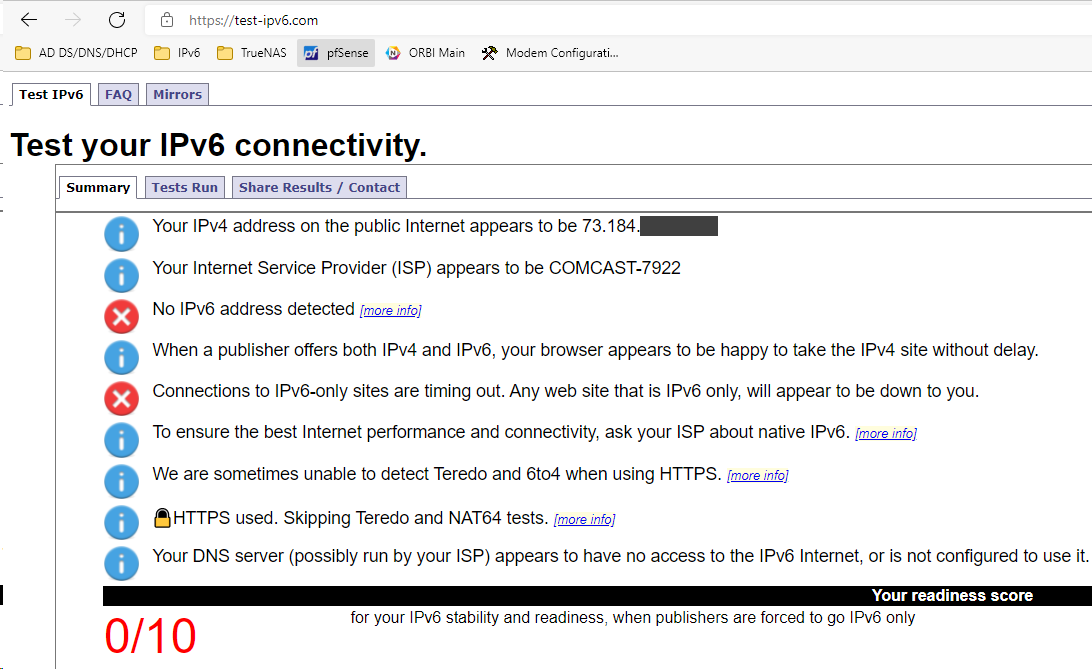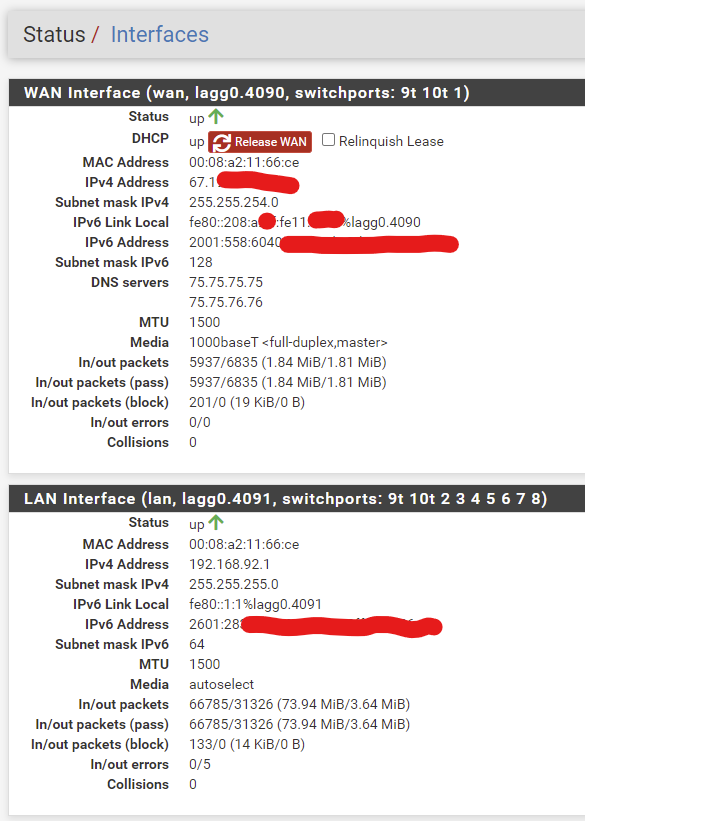Comcast Residential /64 Delegation
-
@bob-dig said in Comcast Residential /64 Delegation:
So if you want to host something at home, you have to use IPv6
This is true - just hope your "clients" have IPv6 -- hehe.. Ask your typical user what their IP is even IPv4 and they look like a deer in headlights.. But yeah that is one actual use for it in a home setup - getting around CGnat in the IPv4 space.
-
@johnpoz I just have to quiz my wife what our subnet private addresses are, or the unifi controller IP, and instant deer in the headlights.

-
@jpvonhemel haha, I get it with normal "users" but ask some so called tech guys what their public IP is - they didn't have a clue.. One of my buddies has some shit home wifi router thing at home.. And I ask him why you don't setup a decent network at home.. He spends all day doing firewalls and routers and switches, etc.. So he just wants to turn off at home.
I get that sort of - but to me IT while its work, is also my hobby/fun.. Stuff I can't play with at work, I can play with at home, etc. Like IPv6 ;)
-
@bearhntr said in Comcast Residential /64 Delegation:
I really want to grasp this IPv6 stuff.
A good reference is IPv6 Essentials.
-
@bob-dig said in Comcast Residential /64 Delegation:
The US has plenty of IPv4 addresses. In other parts of the world this is not the case. For instance in Germany there is more and more IPv4 CG NAT and/or DS-Lite (Dual Stack Lite). So if you want to host something at home, you have to use IPv6... but also every major cellphone provider here supports it ootb, so it is doable, although it sucks big time.
There are plenty stuck behind CGNAT in North America too. My ISP, Rogers, provides IPv6 on both cable and cell networks. On the other hand, the big phone company doesn't yet offer IPv6 to consumers on their ADSL or fibre networks and doesn't properly support it on their cell network. My work phone, on that company, it gets only 1/10 on test-ipv6.com. "Danger IPv6 sorta works - however, large packets appear to fail...". They also don't provide IPv6 to devices connected to the hot spot.
-
Many "tech guys" don't get a lot of things. For example, look at all those who run Windows as admin. That leaves them wide open to malware. On my own computers, I run as a mere mortal, with admin rights when needed, just as I do on Linux.
Many are also not that great on network issues.
-
@jknott Considering our dependency on Windows, I expect to wake up one day and find out that Windows Update promulgated a delayed signed ransomware attack that simultaneously devastated both the enterprise and retail installs, and this then proceeds to global catastrophe.
-
Well this is FRUSTRATING AS HELL!!!
 Got up this AM - noticed that I had a new IPv4 Address on WAN from COMCAST - but the IPv6 one did not change. So I went to the IPv6 test page and now see what I get:
Got up this AM - noticed that I had a new IPv4 Address on WAN from COMCAST - but the IPv6 one did not change. So I went to the IPv6 test page and now see what I get:
I have done done this page too - where COMCAST support sent me:

This makes no sense - at all. Verified that IPv6 is still setup on the NIC of the Server - the same STATIC addresses I put there.

Curtis
-
I used to be a trainer at my job. I used to touch on IPv6 and explain follows:
IPv4 (State . City . Street . House #) - as an example of the 4 numbers.
IPv6 (Planet : Continent : Country : State : City : Street : House # : Room) - so a much more granular address.
It was kewl to see light bulbs come on. LOL
Curtis
-
Agreed - I 95% of the time login to my Windows computers as a 'mere-mortal' and only use Admin stuff when I need it.
I typically login if I have lots to do - on the DC as admin --- so I am not pestered with the warning (you must ask to be a god) --- LOL
Curtis
-
I think they are calling that WINDOWS 11 !!!

Microsoft in kahootz with the computer manufacturers to see more computers for which they cannot get chips for them - so the prices are 4x what they should be.
-
@bearhntr said in Comcast Residential /64 Delegation:
Well this is FRUSTRATING AS HELL!!!
Do a reboot of pfSense. I have to do that daily (via cron) to keep IPv6 working.
-
@bob-dig
OK - care to share? CRON? {steps???}
-
-
@bob-dig
I will have to reboot pfSense later - as I work from home, and in the middle of my day here. I will lose Internet during that period of reboot.
Let you all know.
Curtis
-
@bob-dig said in Comcast Residential /64 Delegation:
Check the box: Do not allow PD/Address release
That wouldn't cause a complete loss of IPv6, only a new prefix.
-
@jknott said in Comcast Residential /64 Delegation:
That wouldn't cause a complete loss of IPv6, only a new prefix.
For me pfSense is failing when the prefix changes so that is why I gave your advice.
-
@bearhntr that analogy not actually true - but ok.. IPv6 is no more granular than IPv4 - there is just way more addresses.
Does not make it more granular.
Think of it this way vs everyone living in say an apartment complex and the mailman having to just drop off and pick up mail from the mail room at the building (nat) - and the building mailman moving the mail to apt A, B and Z, etc.. The address on the mail was granular enough to get to the building, and even has which apartment it is and who - its just the building uses a address scheme for apt that the public mailman doesn't understand
With ipv6 each apartment can just send and get mail directly to their own mailbox.
-
@johnpoz For a residential account, that does not have any option of paying more than a single dynamic public IPv4 address, IPv6 definitely feels more functional in being able to get around this, especially without NAT, and ultimately can be more granular.
Not that I have tried this, but I know I can ping clients directly from anywere over both, but IPv6 should be much cleaner and direct, where IPv4 would require dynamic DNS, NAT, and port forwards to accomplish the same. For a residential account, IPv6 feels like a way around the ISP restricting static and multiple addresses.
-
@jpvonhemel said in Comcast Residential /64 Delegation:
and ultimately can be more granular.
No it is not more granular than IPv4 - still a just an address.. To a device - think you guys need to look up what granular means ;)
His analogy of address makes no sense in comparing ipv4 to ipv6, the ability to have more addresses does not add granularity to the address itself..
Your toaster having its own address - again doesn't add granularity. And that can be done with IPv4..
The ability to not have to nat - doesn't add granularity to the address. Yes IPv6 with the huge amount of space available allows users to have more addresses to use. But that has been possible with IPv4 - you not having enough IPv4 and having enough IPv6 doesn't add granularity - it just adds more addresses.
